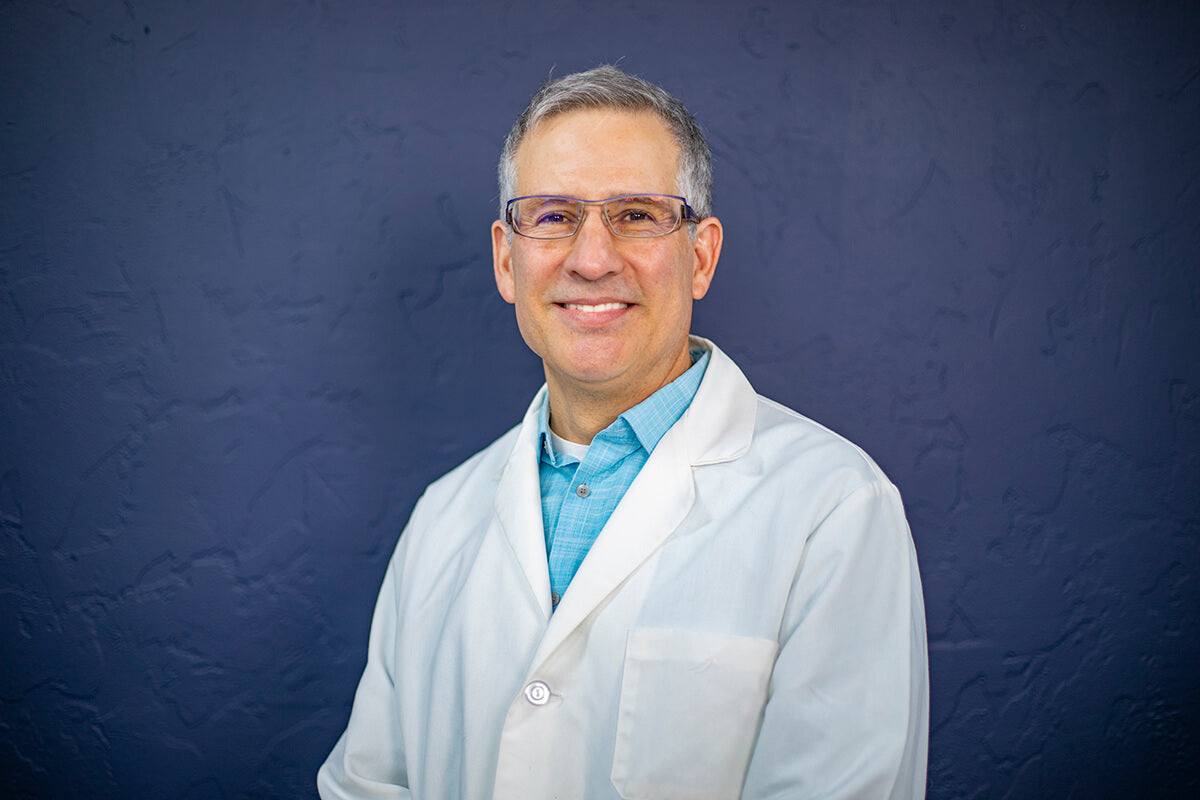
John P. Konhilas, Ph.D
MenoLabs Co-Founder
Co-Founders Danielle Jacobs and Vanessa Ford, both mothers, wives and successful professionals launched MenoLabs with Co-Founder, John P. Konhilas, Ph.D. an Associate Professor with the Department of Physiology and Sarver Molecular Cardiovascular Research at the University of Arizona. Doctor Konhilas is listed as lead researcher on a number of revolutionary new DuPont Probiotic patents including Bifidobacterium animalis ssp. Lactis 420 and has published a large body of work related to menopause and cardiovascular disease, women's health when aging, the gut microbiome, and the effect of probiotics in reducing the symptoms of menopause.
Scientific Biography
20+ Years of Research
According to the CDC (2017) more women than men have died from heart disease over the last 20-25 years. Clearly, menopause is a major factor driving these statistics. Unfortunately, this fact is largely unknown even by well-informed women. In fact, the National Institutes of Health and the American Heart Association do not have a separate institute or focus group that studies menopause. These are major reasons why I do research. I began my research career studying heart disease immediately after completing my undergraduate degree at Duke University in 1992.
"For the last 20 years, my lab has been trying to understand why more women have died from heart disease than men. I quickly learned that, in general, women are underrepresented in clinical studies. In addition, studies intended to understand this difference between women and men were poorly designed."
Since arriving at the University of Arizona, we have been instrumental in using a unique model of menopause to build a better understanding of cardiovascular disease in women. More importantly, our lab soon discovered that the gut microbiome plays a major role in menopausal susceptibility to heart disease and health in general. These 2 major discoveries have shaped my research and reflect the cutting-edge, transformational and translational science that we continue today.
Research Interests
-
Menopause susceptibility to cardiovascular disease
Menopause is a condition that every woman will experience. Along with menopause comes an increased risk for cardiovascular disease (CVD) such that more women than men have died from CVD over the last 20-25 years (CDC; 2017). Yet, the cellular and molecular mechanisms underlying the transition from premenopause/perimenopause (CVD-resistance) to menopause (CVD-susceptible) in women is unknown and is the focus of this project. The critical barrier impeding translational progress is the lack of appropriate models to study menopause. Most studies have used surgical removal of ovaries (ovariectomy) as a model of menopause; yet this technique poorly recapitulates the natural, physiological transition to menopause that over 90% of women experience. We overcome this barrier with administration of the chemical, 4-vinylcyclohexene diepoxide (VCD), where we can mirror progressive ovarian failure and preserve the critical “perimenopause” transitional period, identical to humans. Using the VCD model of menopause, we demonstrate that perimenopausal, like cycling (premenopausal) females, are protected from pathological angiotensin II (Ang II)-induced cardiac remodeling, while menopausal females are not, again, the same as humans.
Our novel finding that perimenopausal females remain protected, despite irregular cycling (prior to complete loss of estrogen), underscores the importance of studying the role of estrogen in CVD, across the transition from perimenopause to menopause. As a steroid hormone, estrogen communicates its actions through nuclear and extranuclear receptors suggesting obligatory integration with cellular signaling pathways. The overarching goal of our research is to determine mechanisms (cellular, genetic and epigenetic) underlying this shift in CVD susceptibility during the peri- to post-menopausal transition.
-
Gut microbiome and cardiac remodeling
Our lab has a long-standing interest in the ability of environmental factors, like diet, to impact cardiac disease. Advances in sequencing and bioinformatic technologies have allowed unprecedented characterization of the gut microbiome. We have discovered novel modifiers of the gut microbiome that protect against cardiac injury following ischemia.
-
Predicting and mitigating postoperative surgical outcomes
(1) Cognitive impairment resulting from cardiac bypass surgery. Although treatment strategies for cardiovascular disease (CVD) are improving, coronary revascularization remains one of the most common interventional procedures. Following CABG surgery, cognitive impairment is reported in 50-75% of patients at discharge, 20-50% at 6 weeks and up to 40% at five years. Exciting new preclinical data from our group shows that systemic administration of Ang-(1-7) attenuates and even reverses CHF-induced cognitive impairment in mice.
Our work has resulted in 2 patent applications (UA13-120 UA 14-167) and an IND application for the for Ang-(1-7) as a protective agent against CABG-induced cognitive impairment. (2) Predicting and mitigating postoperative new onset atrial fibrillation and cardiac remodeling. We have discovered a potential use for Human Amniotic Membranes for the prevention of postoperative (bypass surgery) outcomes. In human subjects, membrane placement during CABG preventative new onset postoperative atrial fibrillation. In mice, we prevented wall thinning post-myocardial infarction.
-
Sarcomere dynamics and crossbridge kinetics
Contractile perturbations downstream of Ca2+ binding to troponin C, the so-called sarcomere-controlled mechanisms, represent the earliest indicators of cardiovascular disease. We can now state the dynamics of cardiac contraction and relaxation during CVD are governed by downstream mechanisms, particularly the kinetics and energetics of the cross-bridge cycle. Our lab focuses on the contractile properties of the cardiomyocyte and how this changes with CVD.







